The 13 most dramatic moments in pro cycling of 2020
A baker's dozen of thrills and spills from this year's bizarre road season
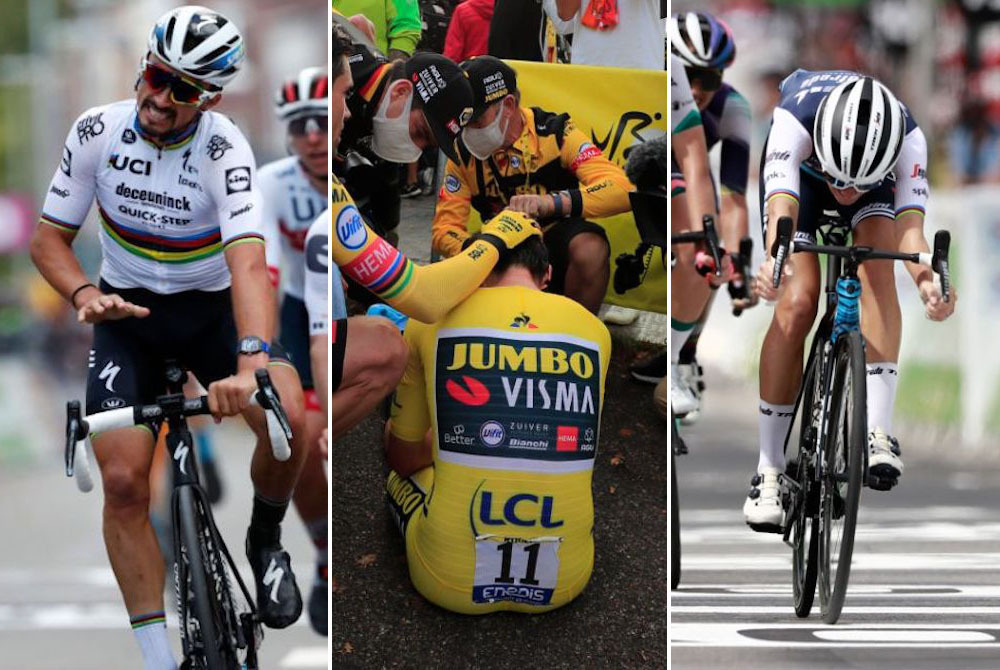
The rollercoaster 2020 pro road season had more peaks and valleys than a typical Grand Tour race, and more twists and turns than an Agatha Christie novel. In fact, while the standard subplots surfaced in the autumn – anguish, escape, intrigue and suspense – the storyline was abruptly derailed in March as the coronavirus pandemic halted the world, including live racing, for six months.
Thrills and spills were replaced with uncertainty, but the 2020 Strade Bianche marked the restart of WorldTour-level professional bike racing on August 1, and it remarkably continued through to November with the completion of all three men's Grand Tours, 10 out of 11 women's WorldTour events and the UCI Road World Championships for elite riders.
From the tumultuous year of pro cycling, here are the moments that Cyclingnews has determined as the most dramatic.
Heist on La Planche des Belles Filles
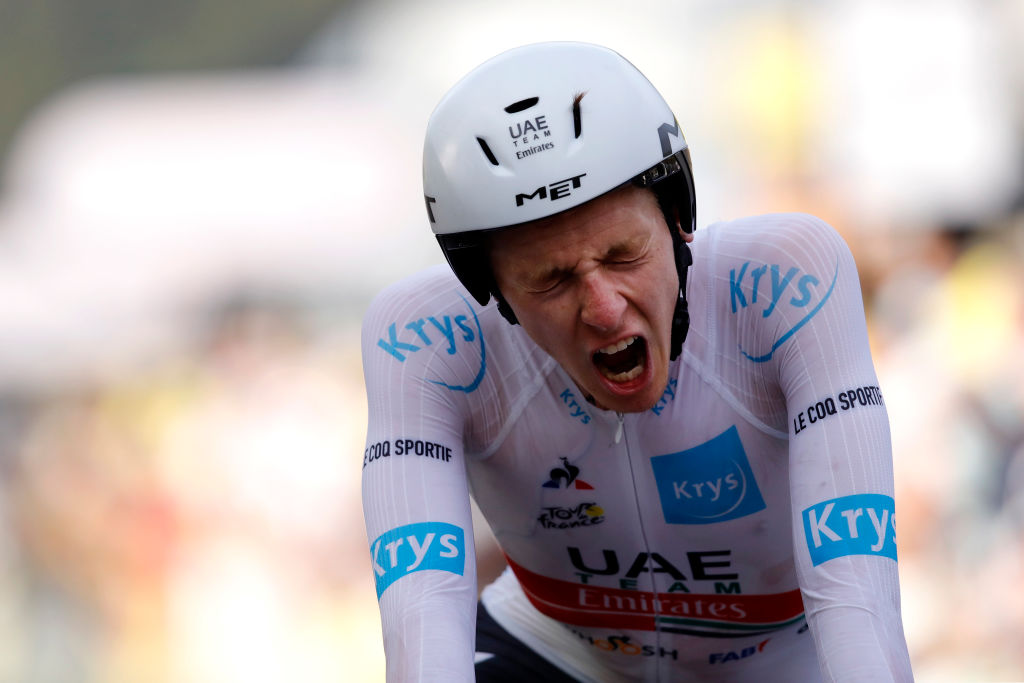
This wasn't just one of the most dramatic moments of the 2020 season but one of the most dramatic moments in cycling history. When Primož Roglič, who'd looked impregnable since the start of the Tour de France, and indeed since the start of the season re-start, set off on the penultimate stage time trial with a 57-second advantage, it was widely seen as a box-ticking exercise ahead of his coronation in yellow.
The first 30 kilometres of the time trial were flat, and while Tadej Pogačar had already made significant inroads, there was still enough potential in the 6km climb up La Planche des Belles Filles – and enough question marks over pacing – to allow for a steadying of the ship. However, as soon as Roglič made his first few pedal strokes after a shaky bike change, it was suddenly clear that the Tour de France was in play.
As Pogačar stormed up the climb, Roglič was visibly suffering, frantically pedalling a lower-than-usual cadence, before the colour drained from his face and his helmet slipped from his head. His pre-stage advantage steadily evaporated and the faces of Jumbo-Visma teammates Tom Dumoulin and Wout van Aert, watching nearby on the big screen in stunned, motionless disbelief, said it all.
Having controlled the race so closely, no one saw the Roglič implosion coming. Then again, it wasn't really an implosion at all. Granted, he was off his best, but he was still fifth on the stage, and it would ordinarily have been enough to hold onto the lead he'd carved out. What we also didn't see coming was Pogačar producing one of the most astonishing rides in Tour history. He won the stage by a huge 1:21, and even if Roglič had beaten second-placed Dumoulin by 23 seconds, he'd still have lost the Tour.
Get The Leadout Newsletter
The latest race content, interviews, features, reviews and expert buying guides, direct to your inbox!
It was stunning drama that was captured in Roglič's demeanour beyond the finish line. As Pogačar roared in delight, his fellow Slovenian, previously inscrutable, sat on the tarmac, lungs convulsing, staring blankly into the middle distance. What on earth had just happened?
Chaos in Liège
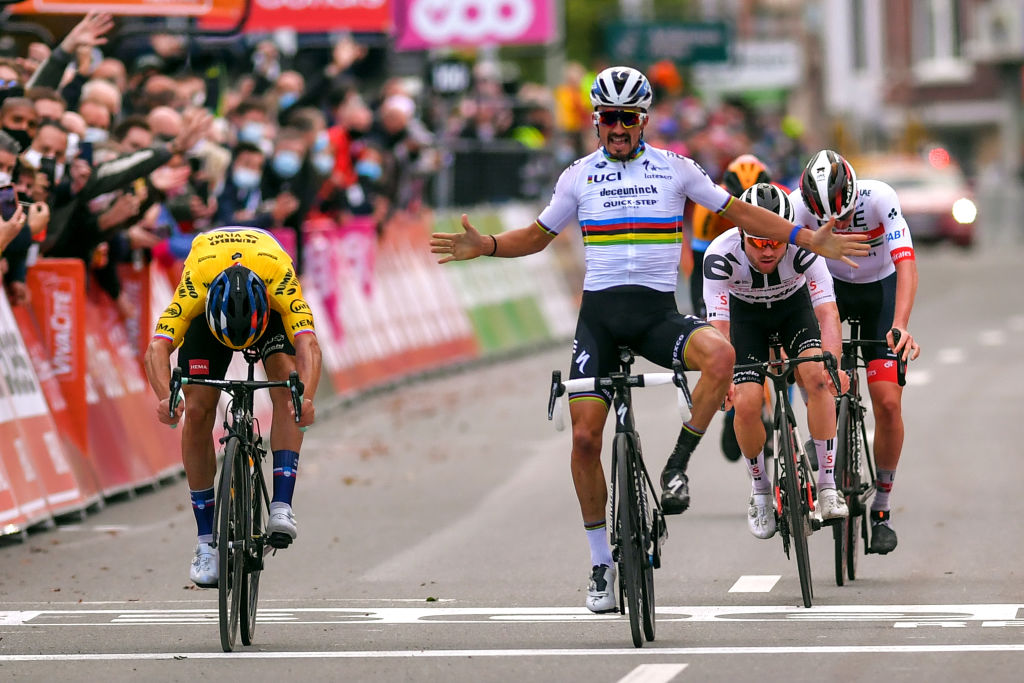
The first 250km of Liège-Bastogne-Liège passed by unremarkably, but the final kilometre contained enough to keep us entertained for days. Julian Alaphilippe's restlessly energetic style is what makes him so exciting as a bike racer, but signs he had slipped from that tightrope between lucidity and disarray came when he swerved sharply back into line after one of many glances over his shoulder.
Another swerve in the sprint for the line brought more gasps, but that was nothing compared to what happened next. The road race world champion, wearing his new rainbow jersey, raised his arms well short of the line, only for Primož Roglič to push all the way and snatch it on the line. Even after the nervy wait for the result to be confirmed, there was more to come, as the jury began reviewing footage of the sprint and eventually decided to relegate Alaphilippe for that swerve that impeded both Marc Hirschi and Tadej Pogačar.
To a certain extent, the decision spared the Frenchman's blushes; at least, that's how he saw it. But the image of him prematurely celebrating won't be so easily erased in the minds of fans. It's embarrassing enough at your local sportive, but when a freshly crowned world champion does it to blow the chance to win Liège for the first time, it's something else. Coupled with the deserved relegation, the whole episode actually altered perceptions of the Frenchman, previously other-worldly and almost universally revered.
Alaphilippe's motorbike collision
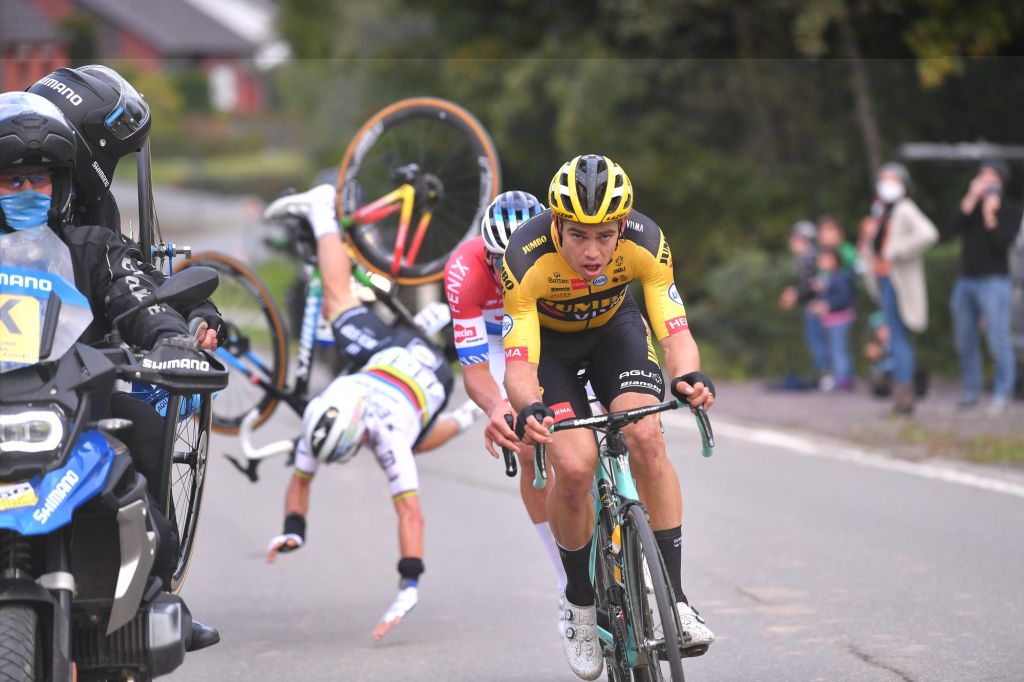
Alaphilippe again, and, following from Liège – not to mention yet another dangerously early celebration at Brabantse Pijl – there was more chaos for the Frenchman on his Tour of Flanders debut. Granted, it's difficult to call his collision with a motorbike a clear-cut error – it was one of those freak events – but it's hard to get away from the feeling something like that had been building over the past couple of weeks.
Alaphilippe, having played down any talk of him being a favourite, made a mockery of his pre-race comments with a typically enthusiastic display that saw him float up the cobbles and open the race early. He was away with the two bona fide favourites Mathieu van der Poel (Alpecin-Fenix) and Wout van Aert (Jumbo-Visma) in what was shaping up to be a mouth-watering contest.
And then it happened. We didn't see how it happened at first, we just saw the world champion writhing on the ground as the others looked around and pressed on. It was a moment of pure drama as we waited for the replays, which showed how Van Aert had looked to use the moto's slipstream until the last minute and Alaphilippe, in third wheel, had no time to avoid it. It was a high-octane moment that came with a comedown as the race had to continue without its main protagonist, and Alaphilippe was left empty-handed with what he'd describe as the best legs he had all year.
Van der Poel and Van Aert sprint for the Ronde
Carrying straight on from our last 'moment' at the Tour of Flanders, Van der Poel and Van Aert rode on together over the Oude Kwaremont and Paterberg and all the way to the finishing straight in Oudenaarde – as, incidentally, Van Aert's former coach Niels Albert had predicted to Cyclingnews on the eve of the race.
Alaphilippe's absence arguably robbed the Flanders finale of maximum drama; it would have been fascinating to see how his attacks would have been met by the old cyclo-cross rivals, who had marked each other out of contention at Gent-Wevelgem just a week previously. Still, after the repercussions from that day, it was enthralling to watch the two get their heads down and ride together to the finish.
The finale was worth the build-up. In a spine-tingling finish on the home straight, Van Aert set up shop on the wheel of Van der Poel, who spun his neck to check back every other second. His alertness paid off, as he clocked Van Aert's move almost as soon as it happened, and immediately opened the taps himself. It was close, and neither rider knew who'd won, leaving a tense wait before the celebrations began for the Dutch champion. In the meantime, Van Aert had already offered him a pat on the back – a moment of true sportsmanship in what is set to be a defining episode in a rivalry that could become one of the greatest in the sport's history.
Thriller at La Course
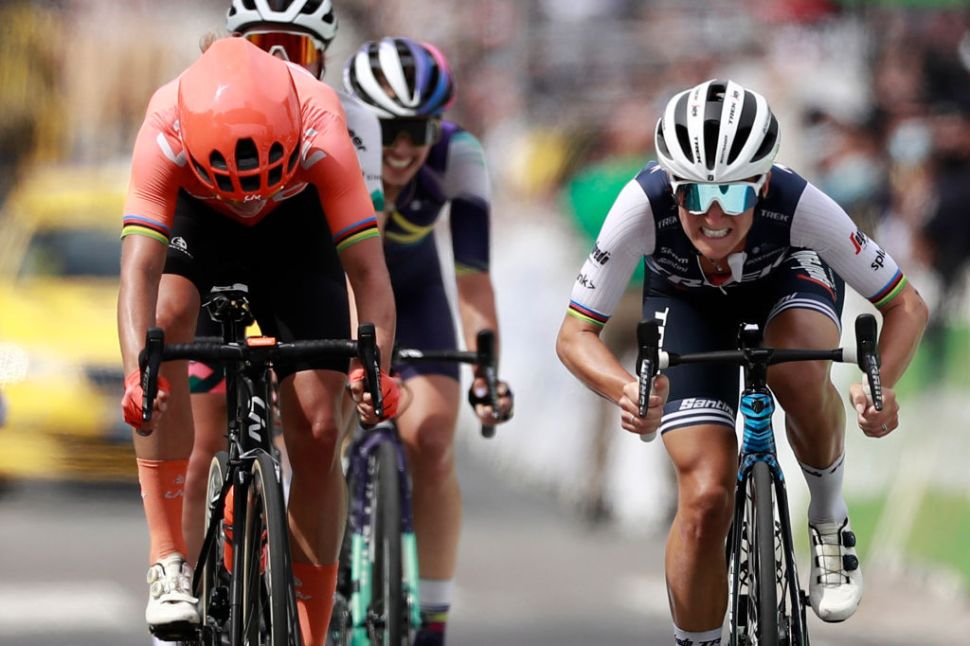
There have been numerous complaints over the format of ASO's offering for women's cycling during the Tour de France, but La Course by Le Tour de France has produced some spectacular moments since its creation in 2014. Annemiek van Vleuten's pursuit and last-gasp catch of Anna van der Breggen in 2018 will be hard to top, but this year's edition produced a thrilling finale on a course many had predicted would yield a bunch sprint.
It was Van Vleuten who'd claimed the route was too easy for a WorldTour event, and the Mitchelton-Scott rider duly shredded the field with an attack on the Côte de Rimiez, bringing five other riders into the finale. The world champion, however, was outnumbered by Trek-Segafredo, who had both Elisa Longo Borghini and Lizzie Deignan in there. In one of the standout instances of teamwork from this season, the Italian repeatedly attacked in order to tire out the others – the last a long-ranger inside the final 500 metres.
Marianne Vos (CCC-Liv) – winner of the first and last edition – was the hot favourite for the sprint, but was forced to open her effort from range in response to Longo Borghini. She hit the front and looked on course, but Deignan was perfectly positioned and came up alongside, with both riders throwing for the line, and a photo finish needed to declare Deignan the winner. A thriller.
Froome and Thomas dropped from Tour team
Ineos Grenadiers' Tour de France line-up announcements are always big moments, but it's something else when they drop the winners of five of the past seven Tours.
Chris Froome's participation had been in question for a good while, as he continued his comeback from a career-threatening injury and started to look for other teams, including a mid-season exit. Still, it was something to see him left off the team sheet – a moment that seemed to mark the end of an era, if not the end of a career, with Froome insistent he can hit his old heights with Israel Start-Up Nation next year.
The real shock factor was the omission of Geraint Thomas, who, like Froome, had shown little sign of form in the build-up races but who had finished first and second in the past two Tours – the previous year after also posting anonymous results all season.
The fall-out was significant, as a number of old pros weighed in on the wisdom of Dave Brailsford's decision, and, with Thomas' replacement Richard Carapaz going on to finish second at the Vuelta a España – and Tao Geoghegan Hart winning the Giro d'Italia – it was a decision that itself will have shaped the course of riders' careers and the team's Grand Tour trajectory.
Bernal's collapse
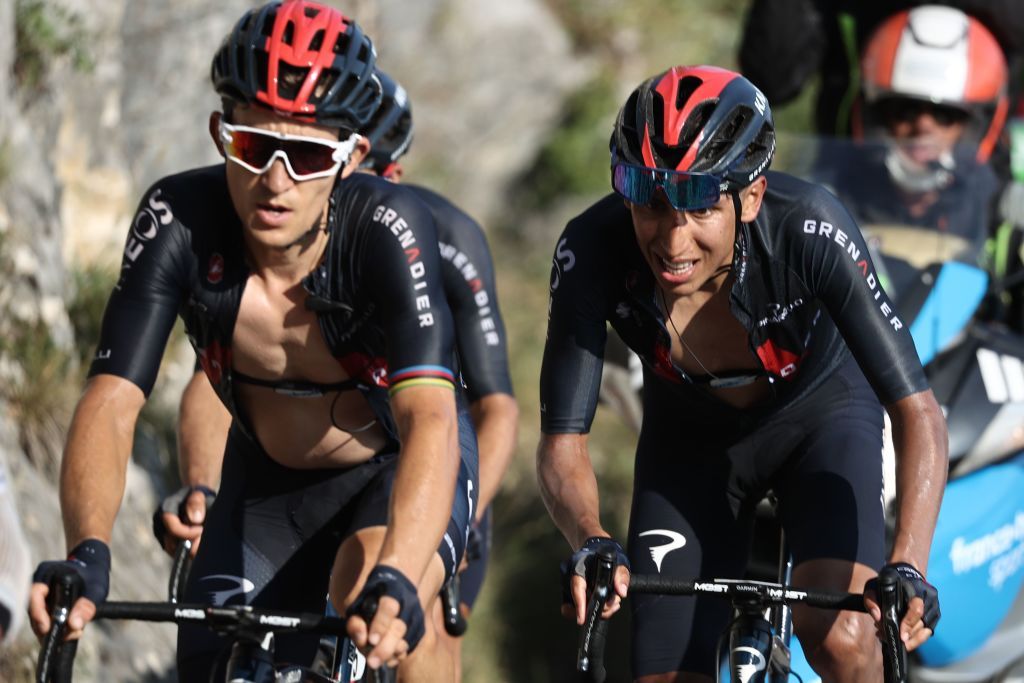
With Froome and Thomas out of the picture, the leadership trident had been carved back into a single focal point in the form of reigning Tour de France champion Egan Bernal. Having won the yellow jersey at the age of 22, he was another year older and wiser and, despite the rise of Primož Roglič and Jumbo-Visma, was still considered the pre-race favourite.
His collapse on the Grand Colombier on stage 15, then, was spectacular. Granted, his form had been questionable since the start of the Tour, and even before it, as he was well beaten by Roglič at the Tour de l'Ain before abandoning the Critérium du Dauphiné. But still, he was third overall and expected to be at his best in the final week. Some 13 kilometres from the top of the mighty Jura mountain, he lost contact, and it was soon apparent it was terminal. The turmoil was made all the worse by Milan-San Remo winner Wout van Aert sitting behind him all the way up the hors-catégorie climb.
That moment has also had knock-on effects, as Bernal has been diagnosed with a spine condition, and talk of a recovery phase that could eat well into 2021. In the summer of 2019, we were talking about Bernal dominating the sport for the next decade, but now, with Tadej Pogačar breaking through and Roglič winning a second Grand Tour, things feel very different.
A wild Giro finale
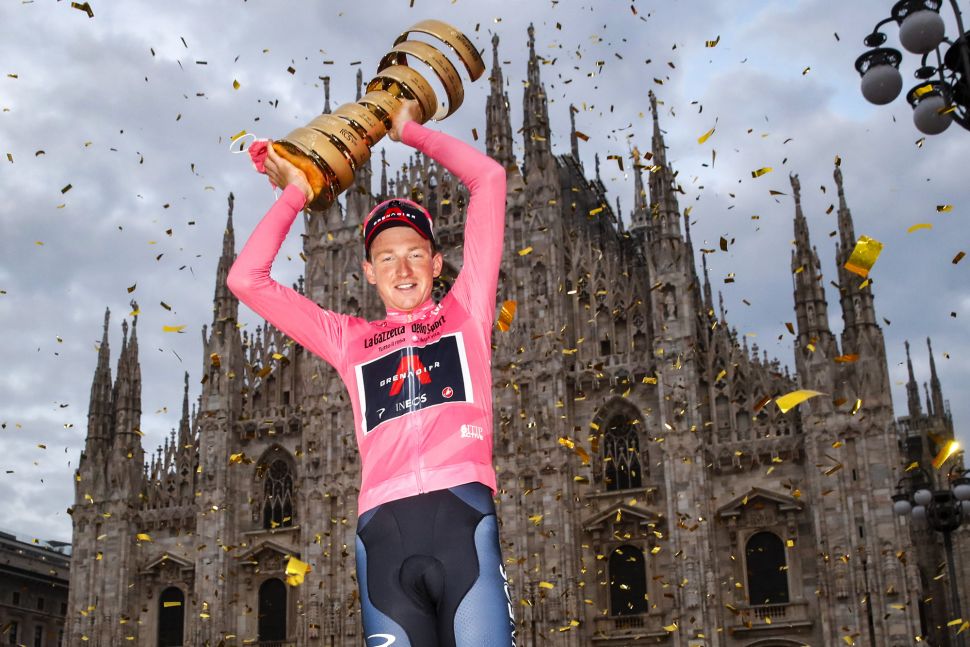
If you predicted a 2020 Giro d'Italia podium of Tao Geoghegan Hart, Jai Hindley and Wilco Kelderman, well, you'd probably now have enough cash to assemble a WorldTour team. The surprise package was partly due to the fact that the two riders installed as favourites had been nursing broken pelvises, partly due to a continuing shift of power towards the young, and also just the illogical nature of the sport in this bizarre season.
Either way, the final week of the Giro was another one for the ages. The Stelvio – the Giro's most iconic mountain – added another chapter in its storied history, as Rohan Dennis blew the Giro wide open, with Geoghegan Hart and Hindley – the latter only after a tense battle with his rain jacket – in his wheel, and destruction in their wake.
Hindley's Sunweb teammate Wilco Kelderman was in pink after stage 18, but the momentum was with Geoghegan Hart, and, even on a rerouted stage 20 that was nowhere near as difficult at would have been if the Col d'Izoard and the Colle dell'Agnello combination had been included – but were dropped due to France's coronavirus restrictions – Dennis did the same at Sestrière two days later. For the first time in history, the top two riders entered the final stage tied on time.
Tension soon ebbed from the final time trial as it became clear Geoghegan Hart was making his superiority against the clock count, but it was still the kind of finale only three weeks of racing can engineer, with a breakout champion, a jaw-dropping domestique display from Dennis – a rider once seen as self-centred – and a race decided by a thrilling combination of strength and tactics.
Cavendish hints at retirement
The presence of 30-time Tour de France stage winner Mark Cavendish in the day's usual futile breakaway at Gent-Wevelgem was surprising enough. When he broke down in tears in the mixed zone and told us that it might have been the last appearance of his career, the cycling world was in shock.
In the end, it turned out the whole thing was caused by rumours that the Driedaagse Brugge-De Panne and the Tour of Flanders were going to be cancelled, and Cavendish raced on, and, in scenes reminiscent of Andy Murray's preliminary retirement from tennis, vowed to continue as the sport paid tribute to his career. We knew Cavendish hadn't won a big race in years and didn't yet have a contract for 2021, but the prospect of one of the all-time greats exiting the sport like that was quite something.
Evenepoel crashes at Il Lombardia
It's never nice to focus on crashes, but Remco Evenepoel's accident at Il Lombardia was dramatic for all the wrong reasons. When he was noted as absent from the front group on the notorious descent of the Sormano, and his bike was seen next to a bridge that ran over a ravine, there was genuine fear for his life.
The Sormano – and that snaking section in particular – has long been highlighted as dangerous and, as debate raged over whether broadcasters should show ambulance footage, there was a more clear-cut question over why the drop to the ravine wasn't protected.
After Evenepoel's Deceuninck-QuickStep teammate Fabio Jakobsen's horrific injuries at the Tour de Pologne, and before Bora-Hansgrohe's Max Schachmann was hit by a civilian car, it was the latest in a long line of incidents that pushed rider safety to the forefront of the agenda. Instead, the UCI chose to focus on the item removed from Evenepoel's pocket by his sports director, launching an anti-doping investigation that left the young Belgian in tears.
Luckily, he 'only' suffered a broken pelvis, and while we'll never know what he would have done on his Grand Tour debut at the Giro d'Italia, he looks to be well on the mend and able to go about fulfilling his enormous potential.
Dygert's Worlds crash

Another horrific crash threw the career of one of the sport's brightest talent into jeopardy. Twenty-three-year-old Chloe Dygert had the world at her feet, but that wasn't so sure anymore when she crashed into a guardrail while defending her elite time trial world title in Imola, Italy.
She had been well on her way to defending it, too, hitting the mid-way checkpoint some 30 seconds quicker than eventual winner Anna van der Breggen (Netherlands). However, disaster struck on a downhill right-hand bend as the American lost control of the bike, colliding with the guardrail, which sliced into her left quad. As with Evenepoel, she looks to be making a good recovery, and hopefully it was only a momentary blip in her progress.
Tension in Vuelta finale
La Covatilla, the final climb of the Vuelta a España, didn't produce quite the same kind of drama as the Giro d'Italia, but it was nevertheless a heart-in-mouth affair. When Richard Carapaz took flight, his acceleration was decisive, and although race leader Primoz Roglič initially appeared alert, it was soon apparent he was in some difficulty.
After losing the Tour de France on the penultimate stage, surely it wasn't going to happen again. In the end, it didn't, as Roglič, assisted by a Movistar duo in a move that triggered its own inquisition, managed to steady the ship and limit the damage to 20 seconds. Calm returned, but for a moment or two, as Carapaz ate into the 45-second gap, it looked like we were heading towards a fittingly barmy finale to the 2020 season.
Groenewegen's ban
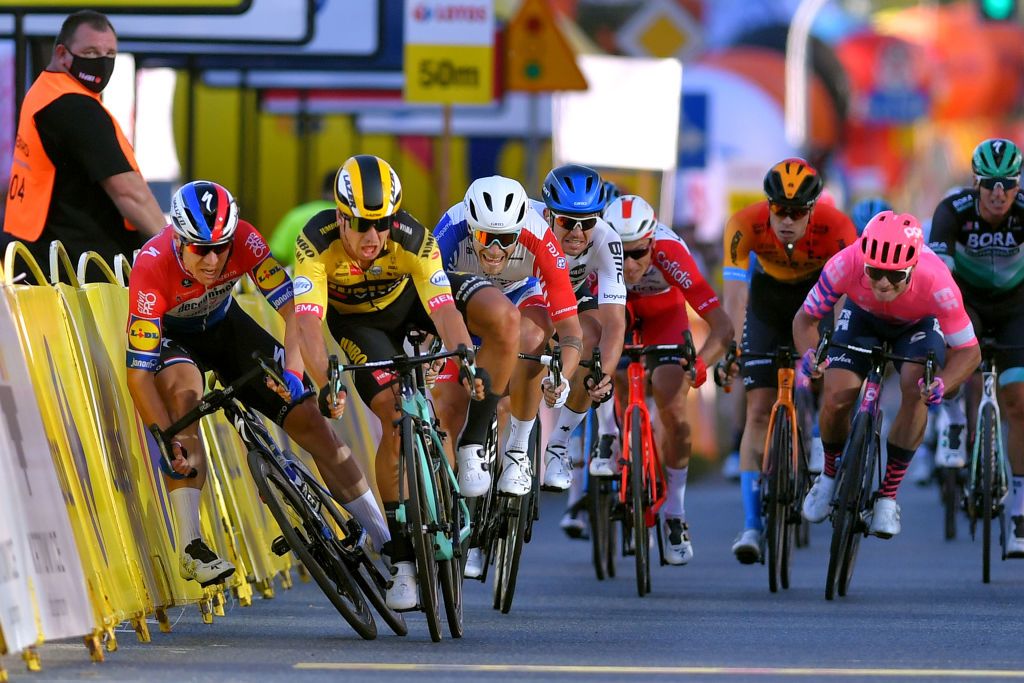
The drama of this had been slightly drained by the fact that Wielerflits broke the story a couple of weeks in advance, but the UCI's own announcement still sent shockwaves. Dylan Groenewegen was banned for nine months. Nine. Granted, Groenwegen's actions had nearly cost Fabio Jakobsen's life, but the punishment seemed to reflect the consequences of the crash more than the cause of it.
Indeed, the consequences would likely have been rather less severe had the Tour de Pologne, a long-term member of the UCI's flagship WorldTour series, placed adequate barriers on a downhill finishing straight that itself has long been criticised as too dangerous.
In the end, the UCI chose to lay the blame at the feet of Groenewegen, with an unprecedented sanction for a sprinter deviating from his line. It was a seismic ruling, which will itself set new precedent that will cause much debate when we inevitably see future infractions.
Patrick is a freelance sports writer and editor. He’s an NCTJ-accredited journalist with a bachelor’s degree in modern languages (French and Spanish). Patrick worked full-time at Cyclingnews for eight years between 2015 and 2023, latterly as Deputy Editor.
